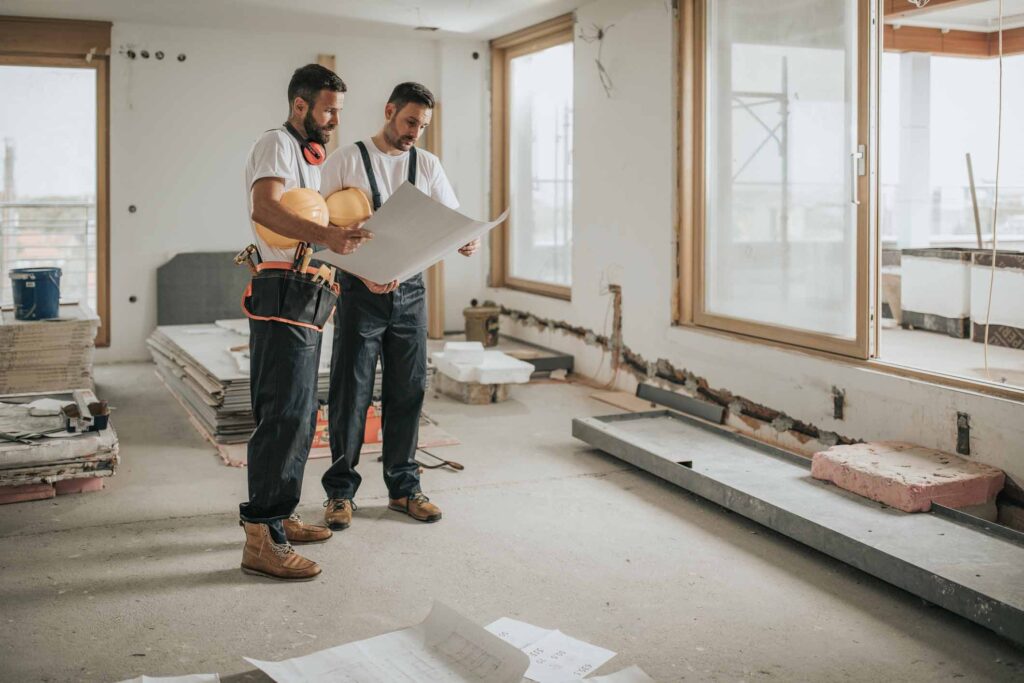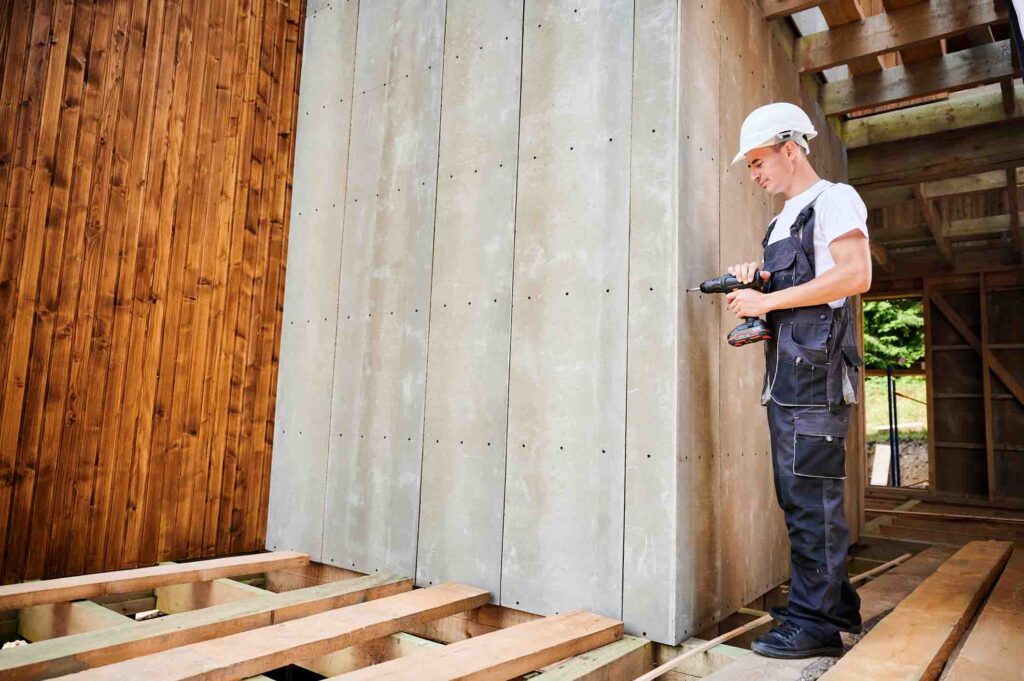Table of contents
Contributors
My main focus is managing the blog and product content for the Protectivity website ensuring everything aligns wi...
As a builder, you play a crucial role in constructing, renovating and maintaining buildings, contributing to the growth and development of communities, businesses and infrastructure. However, working in the construction industry also comes with its own set of risks. To protect yourself, your business, and your clients, it’s essential to have the right insurance coverage.
It’s a legal requirement for builders to have insurance, so not only does it give you reassurance in situations that could be dangerous, it makes good business sense. By carefully considering the specific needs of your construction business and consulting with an insurance professional, you can tailor your insurance portfolio to suit your requirements and work more confidently.
If you’re wondering what insurance builders need, we’ll walk you through the various types in this extensive guide. We’ll explore scenarios in which you might require each insurance and the benefits of having adequate insurance coverage.
Public liability insurance
Builders need public liability insurance, which is pretty fundamental as it covers you in case someone (like a client or a passerby) is injured or their property is damaged as a result of your construction work. Accidents can happen, and without this insurance, you could be held financially responsible for medical bills or property damage claims.
Scenarios when you might need public liability insurance include:
– A passerby trips over debris near your construction site and sustains injuries.
– You accidentally damage a client’s property while working on their project.
Employers’ liability insurance
Employers’ liability insurance is a legal requirement for anyone in the UK employing staff, even on a casual or temporary basis. This insurance covers your employees if they’re injured or become ill due to their work. Failing to have this insurance can result in significant fines.
Here are a couple of scenarios in which you might need employers’ liability insurance:
– One of your employees sustains an injury on the job.
– An employee develops a work-related illness, such as exposure to hazardous materials.
Do self-employed builders need insurance?

Self-employed builders still need insurance. In fact, insurance is just as important for sole traders as it is for larger construction companies. While the specific insurance requirements may vary depending on the size and nature of your construction business, having adequate insurance coverage will protect you against legal fines and financial risks arising from accidents or damages.
Many people require proof of insurance before hiring a builder. Having this in place can make you a more attractive and reliable option for potential clients, as they want to ensure that they won’t be financially burdened in case of any mishaps during the construction project. Being insured demonstrates professionalism and a commitment to the safety and wellbeing of your customers and employees. It can enhance your reputation and build trust among your clients and partners.
In addition, self-employed builders often operate as sole proprietors, which means their personal assets can be at risk if they’re personally liable for accidents, injuries, or damages on a construction site. Insurance can help protect your personal assets from being used to cover liabilities related to your business.
Do owner-builders need insurance?
Owner-builders do usually need insurance, as they are professionals who take on the responsibility of managing and overseeing their own construction or renovation projects, often acting as their own general contractor. Specific insurance types owner-builders may need include:
Contract works insurance*: This insurance provides coverage for the construction work itself, including the building structure, materials, and tools. It can protect against risks such as fire, theft, vandalism, or damage to the construction project during the course of the work.
Home warranty insurance*: In some jurisdictions, owner-builders may be required to obtain home warranty insurance, especially when building a new home. This insurance covers defects or incomplete work after the construction project is finished, ensuring that future homeowners are protected.
Builders’ risk insurance*: If you’re an owner-builder, you need builders risk insurance for renovations. It’s particularly important for substantial renovations and new construction. Builders’ risk insurance protects against damage or loss to the structure while it’s being worked on, due to events like fire, theft, or vandalism.
How much public liability insurance does a builder need?

The amount of public liability insurance a builder needs can vary depending on several factors, including the size and type of projects you take on, your specific circumstances, and contractual requirements. There’s no one-size-fits-all answer, but here are some factors to consider when determining how much coverage is appropriate:
Contractual requirements: Some clients or construction contracts specify that you must have a minimum level of public liability insurance. In such cases, you will need to meet those requirements to secure the contract.
Project size and scope: The size and scope of your construction projects will determine the coverage you need. Larger and more complex projects may require higher coverage limits. You’ll need to take the potential risks of the work you do into account, including the possibility of accidents or damage to third parties.
Industry standards: Research industry standards and practices within your region to get an idea of what is typically required. Each sector of the construction industry has its own expectations for insurance coverage.
Asset protection: Evaluate your personal and business assets. Your insurance coverage should be sufficient to protect your assets in case of a liability claim. Consider what you stand to lose if a significant claim were made against you.
Client expectations: Think about the expectations of your clients. Some clients may prefer or require higher coverage limits to ensure they are adequately protected.
Risk assessment: Conduct a risk assessment of your work. Weigh up the potential risks you face in your day-to-day operations and how much coverage would be necessary to mitigate those risks. Think about the worst-case scenarios and plan accordingly.
Legal requirements: Ensure that you meet the legal requirements for Public Liability Insurance in your jurisdiction. In the UK, there is no specific minimum coverage amount required by law, but you must have adequate coverage to meet potential liability claims.
Workers’ compensation insurance: If you hire workers to help with your construction project, you may need workers’ compensation insurance to cover their medical expenses and lost wages if they’re injured on the job. The specific requirements for workers’ compensation insurance vary by location and the number of employees.
It’s important to note that the coverage amount should be enough to cover potential claims, including legal fees, medical expenses, property damage, and other associated costs. As a rough guide, amounts of £1 million to £5 million are common for many builders in the UK. However, some projects, especially those in high-value or high-risk sectors, may require even higher limits.
Get Builders Insurance with Protectivity
Being a builder involves an assortment of inherent risks, so it’s crucial to be prepared for unexpected events that can disrupt your projects and your livelihood. Having the right insurance coverage in place can provide peace of mind, protect your business, and ensure that you can continue to provide your valuable services without worrying about the financial impact.
Protectivity’s Builders Insurance offers protection against a range of events, so you have the assurance you need to focus on doing your job well. Our Public Liability offers up to £5 million worth of cover arising from accidental injury to a client, or property damage. Employers’ Liability includes up to £10 million of compensation if one of your staff members is injured while working. You can also choose the Products Liability extension, which will protect you in the event that claims are brought against you over third-party products. If you want to insure your tools and equipment, we’ve got you covered as we now offer tools insurance.
Find out more about our liability insurance for tradesman and get an instant quote tailored to your business needs. If you have any questions, our team are on hand to help.
*Not all insurance benefits listed in this guide are included in our Builders Insurance policy. Be sure to check policy documents to make sure you have the correct cover for your needs.
Get Builders Insurance from Protectivity
*Disclaimer – This blog has been created as general information and should not be taken as advice. Make sure you have the correct level of insurance for your requirements and always review policy documentation. Information is factually accurate at the time of publishing but may have become out of date.
Last updated by

















